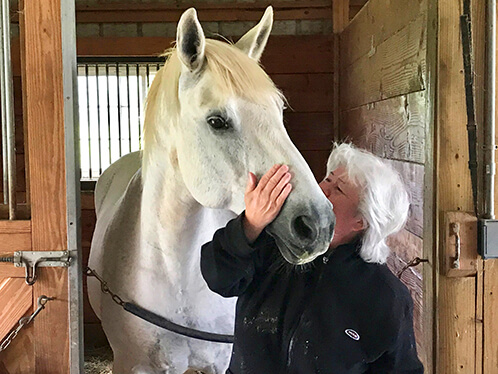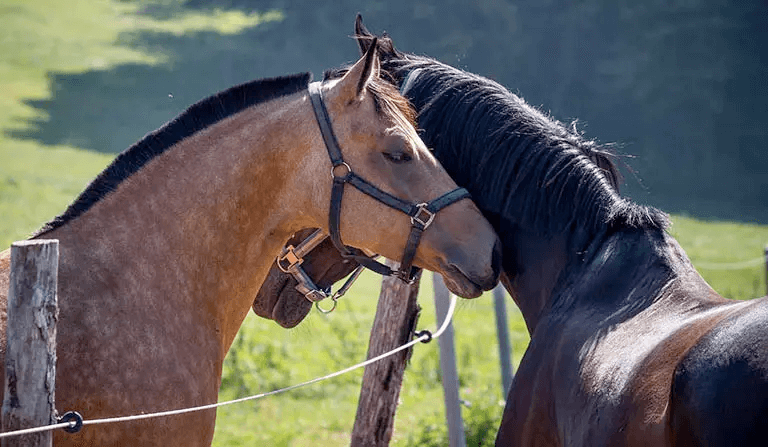These seasonal farm maintenance tips are offered by Horizon Structures, an Amish company in North Carolina that knows a thing or two about ranch buildings and upkeep. Consider this advice as we approach summer.
~
There is always something that needs doing maintenance wise on a horse farm and it is wise to get it done sooner rather than later.
Broken fences, noxious weeds, nefarious critters causing damage, windy weather that wreaks havoc on the horse barn are common issues that require attention.
Here’s a few tips on what to put on the job checklist and complete now to avoid downtime for your horse and save you money and worry.

Down The Rabbit Hole
Nobody wants to experience the possible permanent injuries to their beloved horse that gopher and rabbit holes can exact or be faced with the consequential costly vet bills that come with twisted fetlocks, torn tendons, pulled suspensory ligaments or damaged stifles.
Taking the time to walk the pastures and property in early Spring before the grass gets too high makes it a lot easier to detect holes in the pasture than later in the growing season. Filling holes now can save much pain later.
Regions that experience freeze and thaw through extremes in temperatures during winter may cause pastures to become littered with rocks and stones that have migrated to the surface of the ground. As you are walking the pastures anyway, make the effort to pick up these troublemakers and save your horse the downtime needed to recover from stone bruises to the hoof and chipped hoof walls.
While perusing the pastures look for any for manmade litter that may have arrived from destinations unknown. Detritus from deflated helium balloons or paper lanterns, plastic bags and even tarpaulins may have arrived on scene and can cause life-changing events for your horse.
Keep an eagle eye out for dead vermin dropped from carrion carriers overhead and remove any possible botulism causing tiny carcasses that are located.
Everything Grows
You may marvel at the burst of green that Mother Nature provides during Spring months but along with new growth can come noxious weeds that have silently seeded from the Fall season from elsewhere, carried along by the wind. Remove them completely by digging them out by the roots.
Stands of Burdock should be mown down or dug out as their burrs (prickly heads) may become attached to a horse’s mane and tail or worse cause serious damage to the eye of a horse that attempts to graze between the plants.
Check all electric fence lines for tall weeds and dead stems that may detract from the power of the fence line by grounding it out. Weeds that grow around the barn and landscaped areas, outdoor arenas and doorways should ideally be removed with a non-toxic spray or dug out by hand.
Large shrubs and trees that overhang a pasture or a near a fence line should be pruned back to ensure they have not grown within reach of the inquisitive pastured horse. Trees should be pruned to ensure their falling leaves and seeds do not pose a hazard to either the grazing horse in the pasture or float atop the water tanks and troughs due to overhanging the pasture.
Never use rainwater collected off a roof for a horse’s water supply as it may be contaminated with toxic chemicals used in roofing materials. Clean all water troughs regularly. Keeping the trough free of algae during warmer months may require more frequent cleaning than during other times of year. There is also a myriad of additives that are marketed as safe to use in water troughs to keep algae at bay.
RELATED: Acorns and Horses Don’t Mix
Fence and Gate Safety Check
There should be no need to explain that split fence boards and broken wire fences and gates that close with huge gaps between the post and the gate are recipes for disaster when it comes to a horse sustaining a major injury.
A clean, tidy fence line not only looks good, but it also works better. Even if a horse doesn’t impale himself on a leaning post, damage an eye on a splintered board when trying to graze grass through a huge gap underneath or trap himself in a gateway, a poor fence invites your horse Houdini to escape. And that won’t end well either.
The Other Type Of Horsepower
Machinery only breaks when you are using it! So of course, it always happens when you need it. The best way to limit the annoyance, inconvenience, and likely expense of repairs to equipment is to keep it well serviced.
Aside from the safety concerns of a tractor with no operational hand brake or mowers missing blade guards, the machine engine and its adjunct components requires care and attention to operate efficiently when needed. Check the oil, tires, water, battery, hydraulic fluid, water, air, fuel and oil filters, cabin filters, and follow the vehicles’ manuals guidelines. Service equipment regularly to keep it in good working order.
Out With The Old
Sweep out your hay storage areas and give the space time to air out before your new hay supply comes in to ensure no contamination of the new hay with the old.
Haystacks and hay storage areas are notorious areas for vermin to nest and live, and old hay will dust over time with the breakdown of seeds and stems.
Use the opportunity to check the storage area for any water intrusion from outside the building, either to the floor from under exterior walls or from a leaky roof and fix any issues found. Hay and water don’t mix. Buy good hay and keep it that way.
Security Check
After the winter security cameras and devices may have suffered repositioning due to high winds or snow/ice damage. A quick check for both position and cleaning of the camera lens, and wire check for damage from nibbling by rodents or wind will help ensure the system is fully operational and doing its important job – especially during the summer season when you may be away from home showing horses or on vacation.
Fire Check
Fire extinguishers are not barn decorations and to function properly in an emergency they do need to be charged and checked. Take the time to refresh them and seek advice and recharging options from your local Fire Dept.
It’s a good plan to invite your local Fire Dept. to visit your farm and introduce their members to the horses and even teach them how to handle a horse. Many firefighters have no training in handling horses and are unaware how to respond to a horse trapped in a burning building except to open a door. Taking the time to teach a horse to accept a blindfold and a firefighter how to halter and lead a horse can be a lifesaver perhaps not for your animals but for someone else down the road.
Clean cobwebs, dust and other fire hazards from the barn and check all wiring for safety.
Your local Fire Dept. is also able to assist you in doing a fire check of your building though don’t expect them to break out a broom or start vacuuming.
Paint/Stain and Nail It Now Or Replace It Later
An inspection of your horse barn and run-in sheds may reveal popped nails, ripped shingle, disconnected gutters, or peeling paint.
If you take the time to make the necessary repairs now it will ultimately save you time and money later.
A fresh coat of paint or stain not only lifts the appearance of a building it also protects it from the damaging effects of inclement weather.
If you locate any area of water intrusion into a building, be it through a roof, siding seam or under doors or floors fix it now. Water is a silent but effective agent at causing damage to structures and its invasion to any interior surface of a structure should be viewed as a serious situation that requires prompt remedy.
RELATED: Horse Trailer Maintenance
/

Nikki Alvin-Smith is a seasoned freelance writer who loves to share her lifelong experience with everything horse, farm and travel. Her work has been printed in more than two hundred fifty equestrian magazines worldwide and her published articles number in the thousands including travel and lifestyle press.
A Brit who has called New York home for more than 37 years, Nikki brings a unique perspective to her writing.
Her experience as an international level Grand Prix dressage competitor, coach and worldwide clinician, with a youth spent showjumping and foxhunting, provides lots of educational truths and fun moments to share with the reader. Additionally, she has been a horse breeder and importer of Hanoverian, Dutch and Iberian horses for more than 25 years.
Visit nikkialvinsmithstudio.com to learn more.

